Backgrounder
Full Translation of Peng Shuai’s Weibo Post and Timeline of Events
Published
3 years agoon
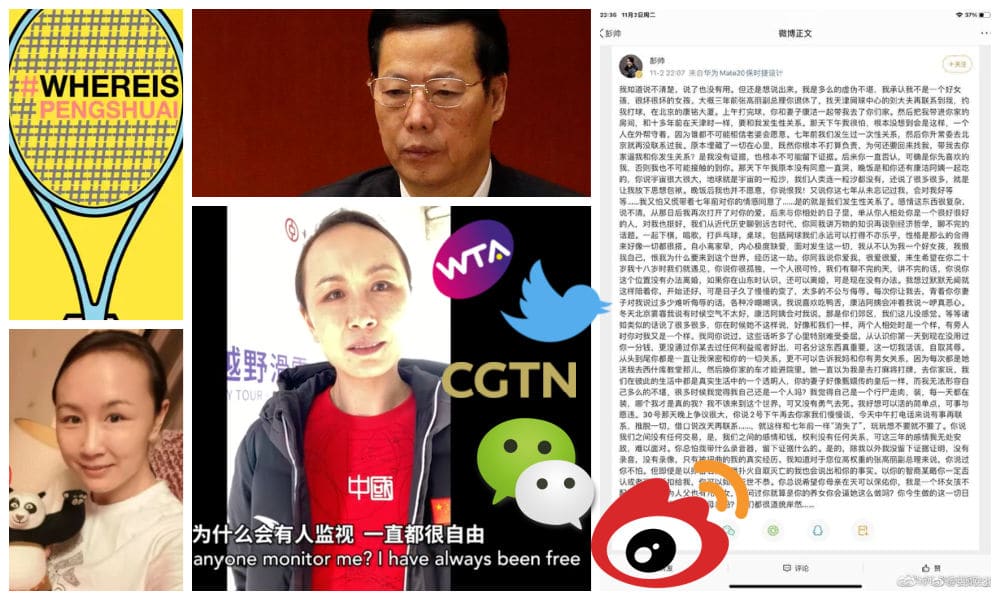
PREMIUM CONTENT ARTICLE
Over the past seven weeks, the whereabouts and safety of Chinese tennis star Peng Shuai have been a matter of constant concern in international (social) media. Here is a timeline of events and a full translation of the Weibo post by Peng Shuai – where it all began.
On the night of November 2nd of 2021, a Weibo post by the 35-year-old Chinese tennis player Peng Shuai (彭帅) sent shockwaves across social media. In her lengthy post, the three-time Olympian describes details surrounding an alleged affair she had with the 75-year-old Zhang Gaoli (张高丽), who served as China’s senior Vice-Premier (2013-2018) and was also a member of China’s highest ruling council, the Politburo Standing Committee (2012-2017).
Here, we will give you a short timeline of the things that unfolded from the moment Peng Shuai’s story was published on Weibo, as well as providing the full text of her post and a translation.
Timeline of Events
November 2nd, 2021
On the night of November 2nd of 2021, 35-year-old tennis player Peng Shuai posts her story on her Weibo account, where she has over 590,000 followers. The post comes online at 22:07 and is sent through a mobile phone.
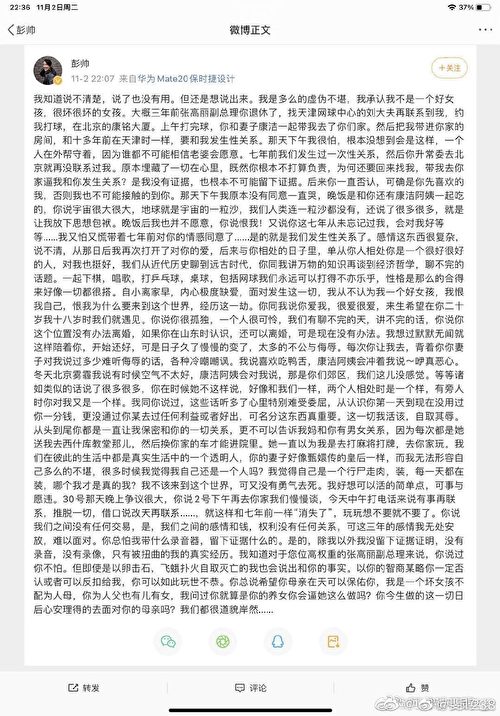
Although Peng’s post was only online for about twenty minutes before it was deleted, its impact was irreversible. Peng Shuai’s Weibo account remained online, but the name ‘Peng Shuai’ started to be censored on Weibo and other Chinese social media platforms, where online discussions about the tennis player and Zhang Gaoli were soon silenced. Peng Shuai’s post and the ensuing silence triggered a wave of global concern about her wellbeing and whereabouts.
November 3, 2021
Peng Shuai’s story makes headlines in the international media, with many Western media outlets describing the issue as a “#MeToo allegation.” within the context of the global #MeToo movement, suggesting Peng’s post was a “MeToo post.” The tennis star did not mention ‘#Metoo’ in her own writings.
November 16, 2021
Japanese tennis player Naomi Osaka attracts more international attention for Peng’s whereabouts when she posts the #WhereisPengShuai hashtag on Twitter. Two days later, tennis star Serena Williams also writes on Twitter: “I am devastated and shocked to hear about the news of my peer, Peng Shuai. I hope she is safe and found as soon as possible. This must be investigated and we must not stay silent.”
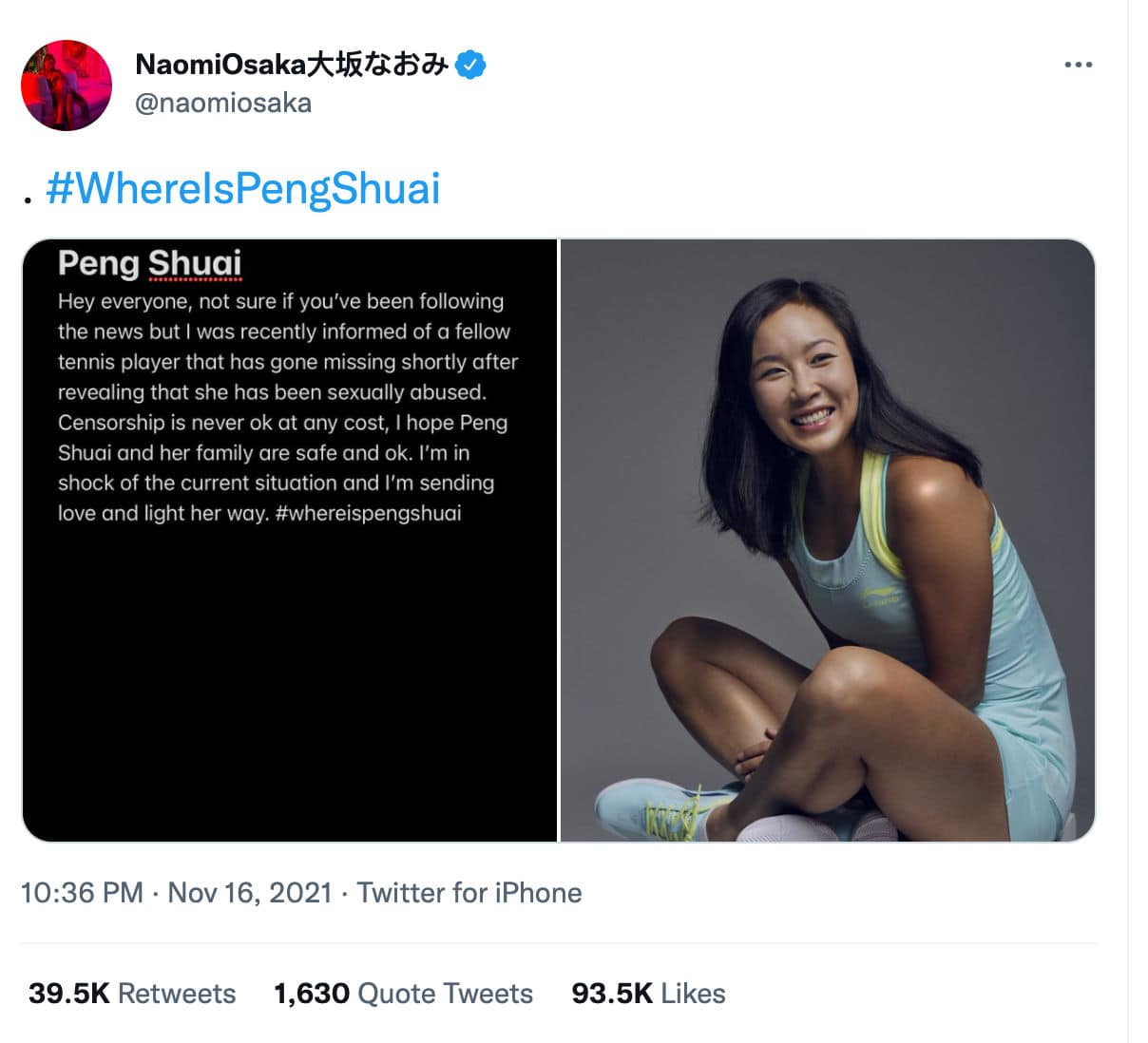
November 17, 2021
While the issue is still completely silenced in Chinese (social) media, the English-language state media outlet CGTN addresses the commotion on Twitter on November 17, when they share a screenshot of an email allegedly sent by Peng to WTA Chairman Steve Simon, saying she was not actually missing and not unsafe.
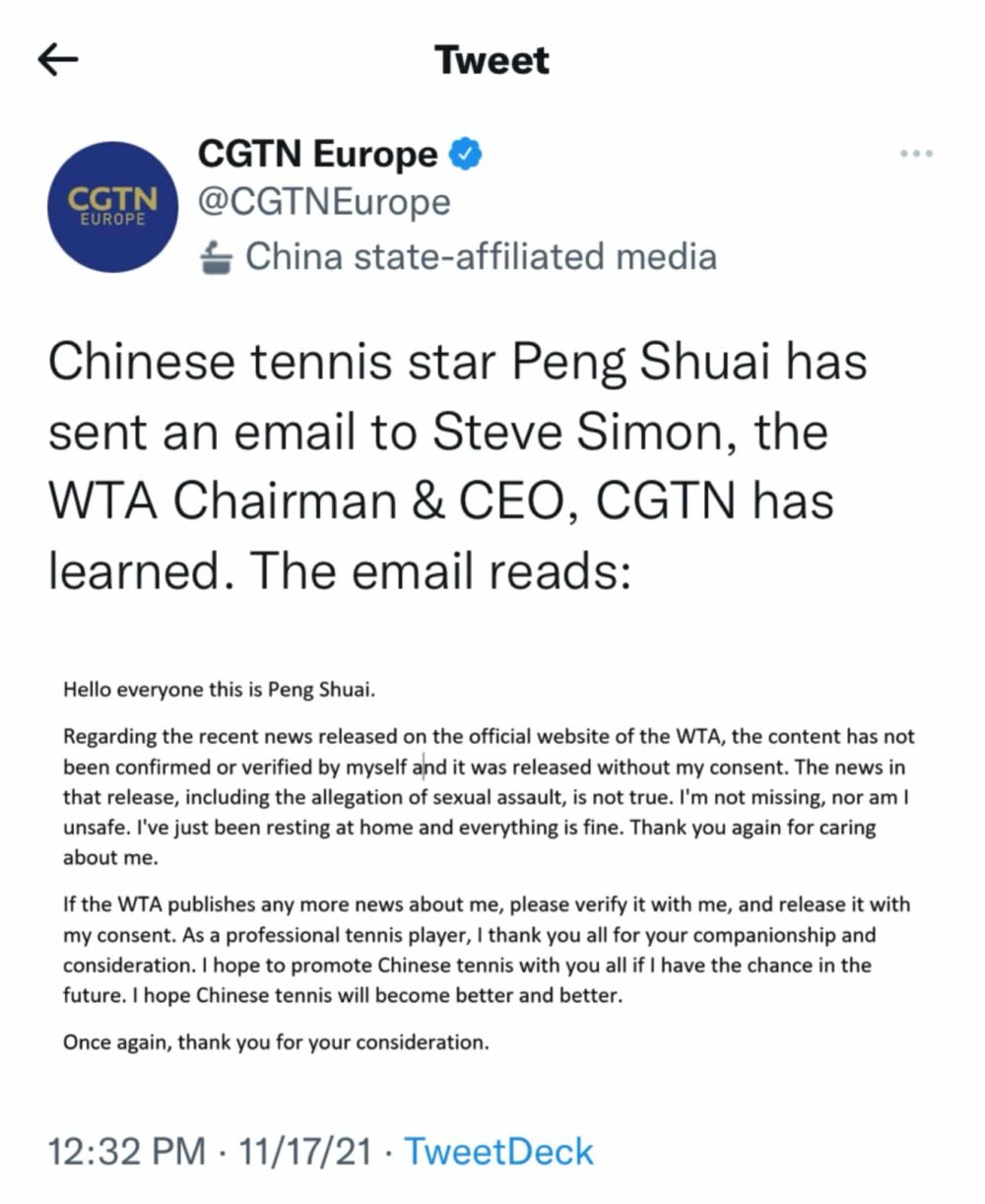
November 19, 2021
While many people still raised their concerns on Twitter – and a White House spokesperson even said the Biden administration was ‘deeply concerned’ about the reports alleging that Peng Shuai had gone missing – photos of Peng Shuai in her home showed up on November 19th, posted on Twitter by Chinese journalist Shen Shiwei (沈诗伟) claiming the tennis star posted them on her WeChat moments herself.
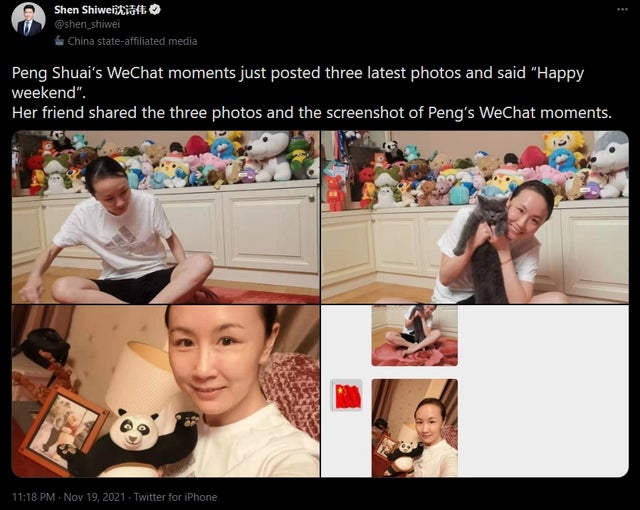
November 20, 2021
One day later, a video was also shared on Twitter by the same Shen, showing Peng enjoying dinner with friends and having conversations in which it was clearly indicated that the date was November 20, 2021.
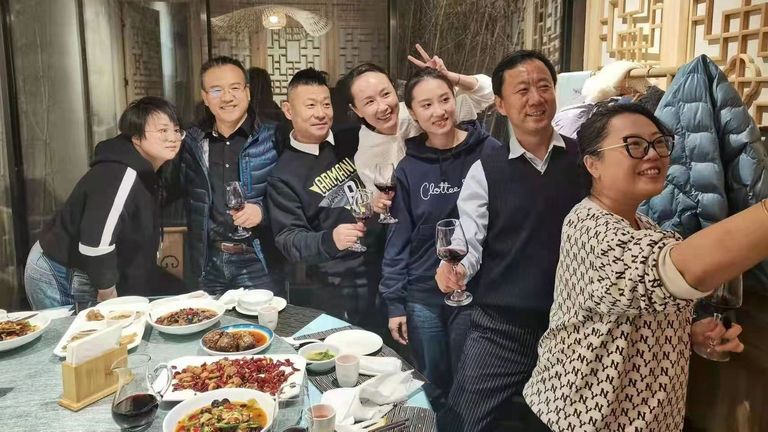
November 21, 2021
During that very same weekend of November 20-21, Peng also reappeared in public when she attended the Junior Tennis Finals in Beijing. This was also the very first time in 19 days that she ‘reappeared’ in mainland China’s online media spheres, where photos of her attendance at the games were also shared online.
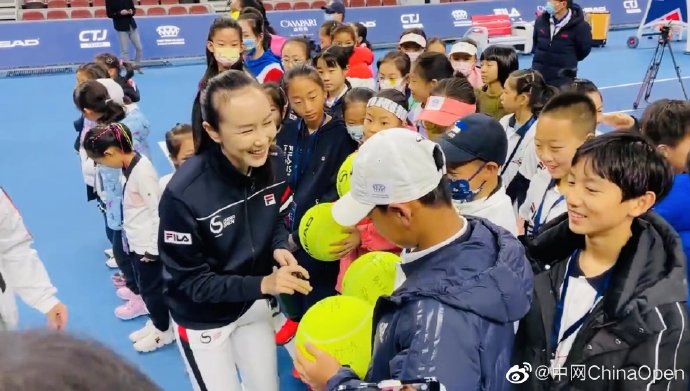
On that same day, it was announced by the Olympics governing body that International Olympic Committee president Thomas Bach held a 30-minute long video phone call with Peng Shuai. Chinese sports official Li Lingwei and the Chair of the Athletes’ Commission, Emma Terho, reportedly were also on the call, during which Peng explained that she was safe and well at her home in Beijing, but would like to have her privacy respected.
November 22, 2021
A Weibo post published by the French embassy in Beijing marks the first time for Peng Shuai’s case to be addressed on Chinese social media.
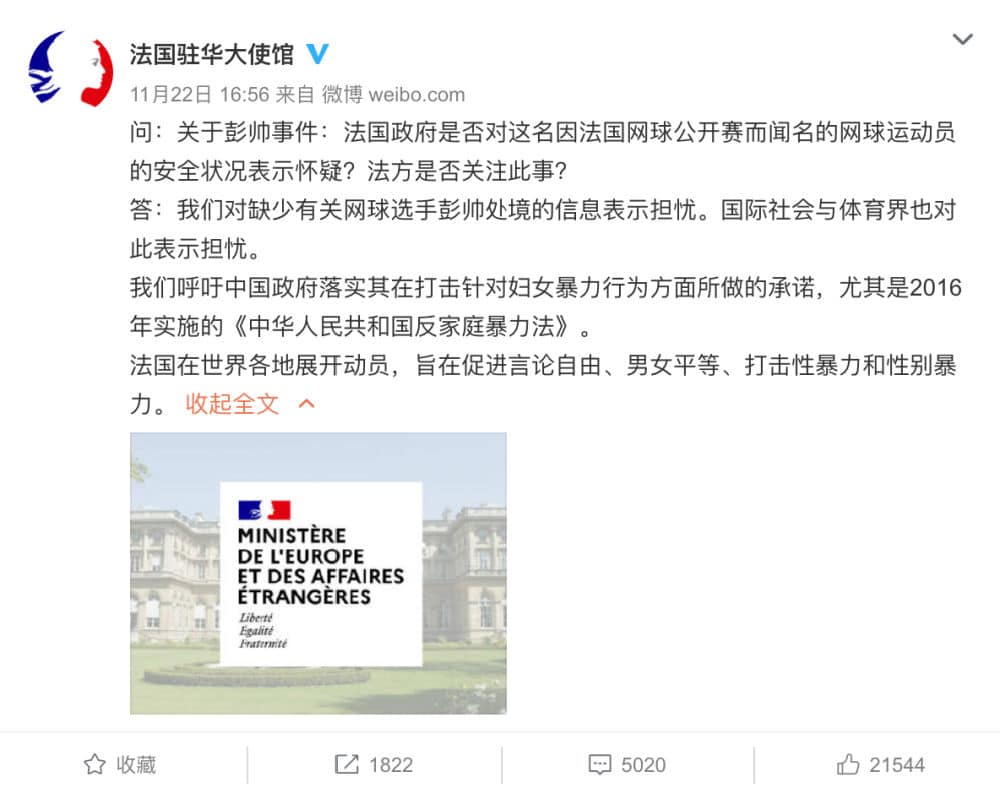
In their post, the French embassy expresses concerns about the lack of information surrounding Peng Shuai, and reiterates its belief in promoting freedom of expression, equality between men and women, and combating sexual and gender-based violence. The post receives many replies, but its comment section is heavily censored.
December 1st, 2021
The WTA (Women’s Tennis Association) announces the suspension of all tournaments in China amid concerns about the safety of Peng Shuai.
In a statement by Steve Simon, WTA Chairman & CEO, the immediate suspension of all WTA tournaments in China, including Hong Kong, was said to also be related to concerns about risks that all players and staff could face if the WTA were to hold events in China in 2022.
Due to the Covid19 situation, there were no WTA events scheduled for China in the near future.
December 7, 2021
The US announces a “diplomatic boycott” of the 2022 Winter Olympics in China. American athletes will still compete at the Winter Games. Although this boycott was not necessarily directed linked to Peng Shuai, many media outlets did connect it to concerns over the tennis player.
December 19, 2021
In an interview with Singapore-based media outlet Lianhe Zaobao (联合早报), Peng Shuai claims she did not accuse Zhang Gaoli of sexually assaulting her.
A video issued by Lianhe Zaobao shows a reporter asking Peng questions during a skiing competition event in Shanghai, where Peng could be seen talking to Chinese basketball player Yao Ming. When the reporter asks Peng if she is free, she answers that she has always been free and is not being monitored.
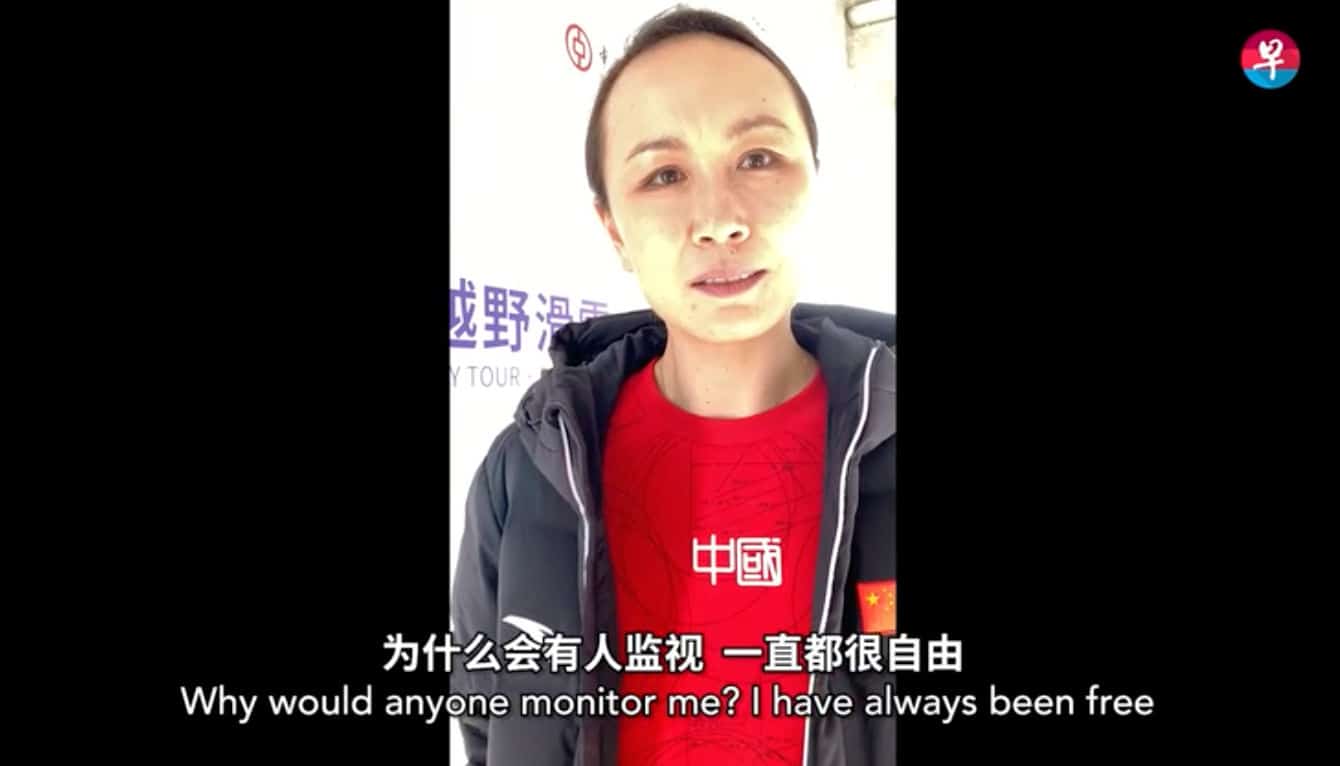
When the reporter addresses the allegations of sexual assault, Peng says:
“First and foremost, I must emphasize. I have never said or written about anyone sexually assaulting me. That’s a very important point. On the Weibo post, that’s my personal issue.”
Peng also confirms that the English email that was screenshotted and published by CGTN on November 17 was written by her in the Chinese version, but that it was translated into English for her since her English language skills aren’t good enough to write such an email herself.
Full Text Translation of Peng Shuai’s Weibo Post
In a previous post, What’s on Weibo gave a partial translation of Peng’s Weibo post. Here, we will provide a full translation. Please note that this is a translation provided by What’s on Weibo and not an official translation issued by any other party.
我知道说不清楚,说了也没有用。但还是想说出来。我是多么的虚伪不堪,我承认我不是一个好女孩,很坏很坏的女孩。大概三年前张高丽副总理你退休了,找天津网球中心的刘大夫再联系到我,约我打球,在北京的康铭大厦。上午打完球,你和妻子康洁一起带我去了你们家。然后把我带进你家的房间,和十多年前在天津时一样,要和我发生性关系。
“I know I can’t say it clearly and that it’s useless to say. But I want to say it anyway. I’m such a hypocrite. I’ll admit I’m not a good girl, I’m a bad bad girl. About three years ago, Vice Premier Zhang Gaoli, you had retired and asked Dr. Liu from the Tianjin Tennis Center to contact me again to play tennis at the Kang Ming Hotel in Beijing. After we finished playing in the afternoon, you and your wife Kang Jie took me with you to your home. You then took me to your room, and like what happened in Tianjin over ten years ago, you wanted to have sex with me.”
那天下午我很怕,根本没想到会是这样,一个人在外帮守着,因为谁都不可能相信老婆会愿意。七年前我们发生过一次性关系,然后你升常委去北京就再没联系过我。原本埋藏了一切在心里,既然你根本不打算负责,为何还要回来找我,带我去你家逼我和你发生关系?是我没有证据,也根本不可能留下证据。后来你一直否认,可确是你先喜欢的我,否则我也不可能接触的到你。
“I was very scared that afternoon, I had not expected things to go this way, someone was guarding outside,1 because nobody would believe that a wife would allow this. Seven years earlier we had sexual relations once, and then you – promoted as a member of the Standing Committee – went to Beijing and never contacted me again. I had buried it all inside me, and since you were not planning on taking responsibility at all, why did you come and look for me again, take me to your house, and force me [逼 = force, press for] into sex? I have no proof, and it would be impossible for me to keep any evidence. You denied everything afterward, but it is true that you liked me first, or otherwise, I wouldn’t have had a way to come into contact with you.”
那天下午我原本没有同意一直哭,晚饭是和你还有康洁阿姨一起吃的,你说宇宙很大很大,地球就是宇宙的一粒沙,我们人类连一粒沙都没有,还说了很多很多,就是让我放下思想包袱。晚饭后我也并不愿意,你说恨我!又说你这七年从未忘记过我,会对我好等等……我又怕又慌带着七年前对你的情感同意了……是的就是我们发生性关系了。
“That afternoon I originally did not agree and cried the whole time, and I still had dinner with you and auntie Kang Jie together. You said the universe is so big, that the earth is just a grain of sand in the universe, and that we as mankind are not even a grain of sand, and you said a lot more to alleviate the load on my mind. After dinner I still did not want to, and you said you hated me! You also said that in these seven years, you never forgot me and that you would be good for me etc etc. I was afraid and panicked and carrying the emotions of seven year ago, I agreed…yes, we had sex.”
感情这东西很复杂,说不清,从那日后我再次打开了对你的爱,后来与你相处的日子里,单从你人相处你是一个很好很好的人,对我也挺好,我们从近代历史聊到远古时代,你同我讲万物的知识再谈到经济哲学,聊不完的话题。一起下棋,唱歌,打乒乓球,桌球,包括网球我们永远可以打得不亦乐乎,性格是那么的合得来好像一切都很搭。
“The feelings between two people can be very complicated, I can’t clearly explain, [but] after that day I again began to open up to your love. In the days I interacted with you afterward, purely from how we got along, you were a very good person and also treated me well. We would talk about anything from modern history to ancient times, you spoke to me about so much knowledge and talked about economic philosophy, [we had] endless talks about topics. We played chess together, sang songs, played ping pong, billiards, and, including tennis, we could always have a good time. Our personalities got along well together, it looked like we were a great match.”
自小离家早,内心极度缺爱,面对发生这一切,我从不认为我一个好女孩,我恨我自己,恨我为什么要来到这个世界,经历这一劫。你同我说你爱我,很爱很爱,来生希望在你二十岁我十八岁时我们就遇见。你说你很孤独,一个人很可怜,我们有聊不完的天,讲不完的话,你说你这个位置没有办法离婚,如果你在山东时认识,还可以离婚,可是现在没有办法。我想过默默无闻就这样陪着你,开始还好,可是日子久了慢慢的变了,太多的不公与侮辱。每次你让我去,背着你你妻子对我说过多少难听侮辱的话,各种冷嘲嘲讽。我说喜欢吃鸭舌,康洁阿姨会冲着我说~咿真恶心。冬天北京雾霾我说有时候空气不太好,康洁阿姨会对我说,那是你们郊区,我们这儿没感觉。等等诸如类似的话说了很多很多,你在时候她不这样说,好像和我们一样,两个人相处时是一个样,有旁人时你对我又是一个样。我同你说过,这些话听多了心里特别难受委屈。
“Since I left home early in my childhood, I felt a lack of love in my heart. Facing everything that was happening, I never thought I was a good girl. I really hated myself, hated why I had to come into this world and experience this disaster. You told me that you loved me, very very much, and that in the next life you hoped to meet me when you are 20 and I am 18 years old. You said you were very lonely, that you felt miserable, we had days of endless chats, endless talks, you said there was no way for you to divorce in your position, that if we’d met while you were in Shandong, you could have still divorced, but that there was no way now. I thought about staying with you like this without attracting public attention, which was okay in the beginning, but the days slowly started to change, and there was too much injustice and insult. Every time you let me go, your wife would say many offensive insulting words to me behind your back, [giving me] all kinds of sneers. When I said I like to eat duck tongue, auntie Kang Jie would go and say ~ ugh, how disgusting. During Beijing’s winter smog, I said sometimes the air is not very good, and auntie Kang Jie would tell me ‘that’s just your suburbs, we do not notice a thing here.’ And so on, there were many of such talks, but she would never do it when you were there. It was similar to when we were together – when it was just the two of us you’d be this way, when there were others there you’d act that way. I told you that these kinds of words were really painful to hear.”
从认识你第一天到现在没用过你一分钱,更没通过你某去过任何利益或者好出,可名分这东西真重要。这一切我活该,自取其辱。从头到尾你都是一直让我保密和你的一切关系,更不可以告诉我妈和你有男女关系,因为每次都是她送我去西什库教堂那儿,然后换你家的车才能进院里。她一直以为我是去打麻将打牌,去你家玩。我们在彼此的生活中都是真实生活中的一个透明人,你的妻子好像甄嬛传的皇后一样,而我无法形容自己多么的不堪,很多时候我觉得我自己还是一个人吗?我觉得自己是一个行尸走肉,装,每一天都在装,哪个我才是真的我?我不该来到这个世界,可又没有勇气去死。我好想可以活的简单点,可事与愿违。
“From the first day I met you up to today, I’ve never used a penny of yours, and I’ve never used you for any personal benefits, but a person’s status is very important. I deserved all of this, I courted disaster. From beginning to end, you have always asked me to keep my relationship with you secret, let alone tell my mother that we were in a relationship. Every time she brought me to the Xishiku cathedral, I would have to change to your car to be able to enter the courtyard. She always thought I was going to your place to play mahjong and cards. We were transparent individuals in each other’s lives. Your wife seemed like the Empress in Empresses of the Palace (甄嬛传), and I can’t describe how bad I felt, and how many times I wondered if I was still an actual person myself. I felt like a zombie, I was pretending so much every day that I didn’t know who the real me was anymore. I shouldn’t have come into this world, but I didn’t have the courage to die. I wanted to live a simpler life, but things turned out contrary to what I wanted.”
30号那天晚上争议很大,你说2号下午再去你家我们慢慢谈,今天中午打电话来说有事再联系,推脱一切,借口说改天再联系……,就这样和七年前一样“消失了”,玩玩想不要就不要了。你说我们之间没有任何交易,是,我们之间的感情和钱,权利没有任何关系,可这三年的感情我无处安放,难以面对。你总怕我带什么录音器,留下证据什么的。是的,除我以外我没留下证据证明,没有录音,没有录像,只有被扭曲的我的真实经历。我知道对于您位高权重的张高丽副总理来说,你说过你不怕。但即使是以卵击石,飞蛾扑火自取灭亡的我也会说出和你的事实。以你的智商某略你一定否认或者可以反扣给我,你可以如此玩世不恭。你总说希望你母亲在天可以保佑你,我是一个坏女孩不配为人母,你为人父也有儿有女,我问过你就算是你的养女你会逼她这么做吗?你今生做的这一切日后心安理得的去面对你的母亲吗?我们都很道貌岸然……
“There was a big dispute on the night of the 30th [October], and you told me to come to your place on the afternoon of the 2nd [November] so we could talk things over. Today a phone call came that something had come up and you’d contact me again. Evading everything, with the excuse that we would get in touch another day ……, this is the same “disappearing act” as seven years ago, getting rid of me after you’re done playing with me. You said there were no transactions between us, that’s true, with all the feelings and money between us, it had nothing to do with power and wealth. But I have nowhere to leave my feelings of the past three years, it’s very hard to face. You were always afraid that I would bring some kind of recorder and leave evidence or something. Apart from myself, there is indeed no evidence left, no recordings, no videos, only my distorted real experiences. I know that for someone of your status, Vice Premier Zhang Gaoli, you’ve said that you’re not afraid. But even it’s like striking a stone with an egg, and courting self-destruction like a moth to the flame, I will tell the truth about you. With your intelligence, I’m certain you will deny it or you can blame it on me, or disregard it. You always said you hoped your mother in heaven could bless and protect you. I am a bad woman who doesn’t deserve to be a mother, but you are a father with both a son and a daughter. I have asked you this before: if it was your adopted daughter, would you have forced her to do this? Do you still have the courage to face your mother after everything you’ve done in your lifetime? We sure all like to pose as people with high morals…”
By Manya Koetse
1 There’s been some discussions on the correct translation of this part of the sentence (“一个人在外帮守着”). One of our readers suggested translating it as “an outsider fending for herself,” although others dispute that translation. “A person guarding outside” is another way to translate this sentence: “I was very scared that afternoon, I had not expected things to go this way, a person on guard outside, because nobody would believe that a wife would allow this.”
Spotted a mistake or want to add something? Please let us know in comments below or email us. First-time commenters, please be patient – we will have to manually approve your comment before it appears.
©2021 Whatsonweibo. All rights reserved. Do not reproduce our content without permission – you can contact us at info@whatsonweibo.com.
Manya is the founder and editor-in-chief of What's on Weibo, offering independent analysis of social trends, online media, and digital culture in China for over a decade. Subscribe to gain access to content, including the Weibo Watch newsletter, which provides deeper insights into the China trends that matter. More about Manya at manyakoetse.com or follow on X.

Backgrounder
“Oppenheimer” in China: Highlighting the Story of Qian Xuesen
Qian Xuesen is a renowned Chinese scientist whose life shares remarkable parallels with Oppenheimer’s.
Published
2 years agoon
September 16, 2023By
Zilan Qian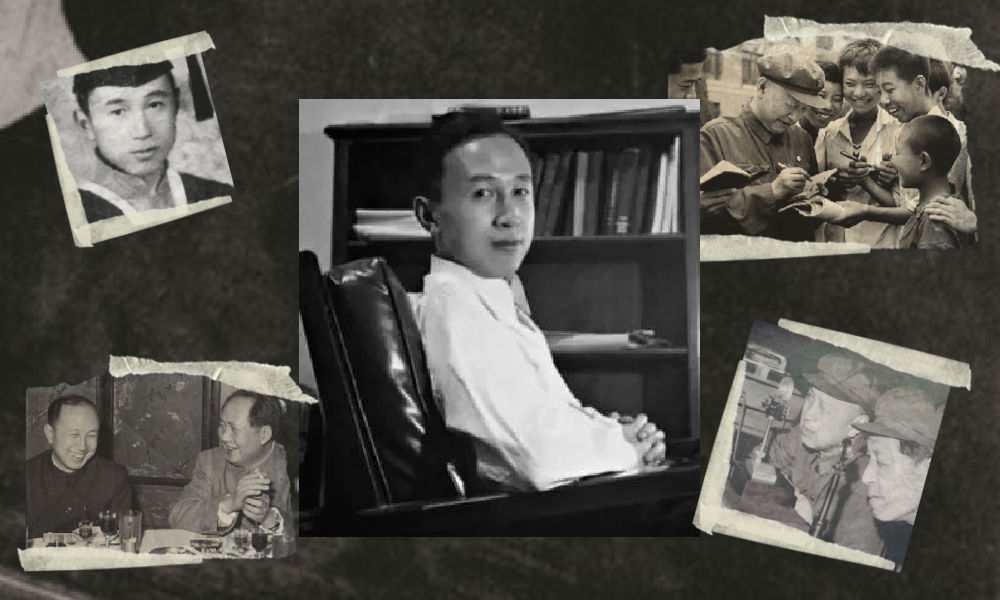
They shared the same campus, lived in the same era, and both played pivotal roles in shaping modern history while navigating the intricate interplay between science and politics. With the release of the “Oppenheimer” movie in China, the renowned Chinese scientist Qian Xuesen is being compared to the American J. Robert Oppenheimer.
In late August, the highly anticipated U.S. movie Oppenheimer finally premiered in China, shedding light on the life of the famous American theoretical physicist J. Robert Oppenheimer (1904-1967).
Besides igniting discussions about the life of this prominent scientist, the film has also reignited domestic media and public interest in Chinese scientists connected to Oppenheimer and nuclear physics.
There is one Chinese scientist whose life shares remarkable parallels with Oppenheimer’s. This is aerospace engineer and cyberneticist Qian Xuesen (钱学森, 1911-2009). Like Oppenheimer, he pursued his postgraduate studies overseas, taught at Caltech, and played a pivotal role during World War II for the US.
Qian Xuesen is so widely recognized in China that whenever I introduce myself there, I often clarify my last name by saying, “it’s the same Qian as Qian Xuesen’s,” to ensure that people get my name.
Some Chinese blogs recently compared the academic paths and scholarly contributions of the two scientists, while others highlighted the similarities in their political challenges, including the revocation of their security clearances.
The era of McCarthyism in the United States cast a shadow over Qian’s career, and, similar to Oppenheimer, he was branded as a “communist suspect.” Eventually, these political pressures forced him to return to China.
Although Qian’s return to China made his later life different from Oppenheimer’s, both scientists lived their lives navigating the complex dynamics between science and politics. Here, we provide a brief overview of the life and accomplishments of Qian Xuesen.
Departing: Going to America
Qian Xuesen (钱学森, also written as Hsue-Shen Tsien), often referred to as the “father of China’s missile and space program,” was born in Shanghai in 1911,1 a pivotal year marked by a historic revolution that brought an end to the imperial dynasty and gave rise to the Republic of China.
Much like Oppenheimer, who pursued further studies at Cambridge after completing his undergraduate education, Qian embarked on a journey to the United States following his bachelor’s studies at National Chiao Tung University (now Shanghai Jiao Tong University). He spent a year at Tsinghua University in preparation for his departure.
The year was 1935, during the eighth year of the Chinese Civil War and the fourth year of Japan’s invasion of China, setting the backdrop for his academic pursuits in a turbulent era.
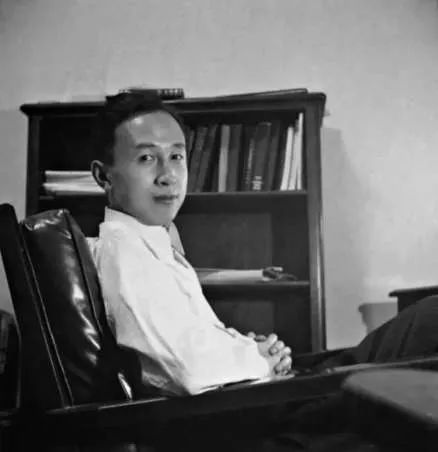
Qian in his office at Caltech (image source).
One year after arriving in the U.S., Qian earned his master’s degree in aeronautical engineering from the Massachusetts Institute of Technology (MIT). Three years later, in 1939, the 27-year-old Qian Xuesen completed his PhD at the California Institute of Technology (Caltech), the very institution where Oppenheimer had been welcomed in 1927. In 1943, Qian solidified his position in academia as an associate professor at Caltech. While at Caltech, Qian helped found NASA’s Jet Propulsion Laboratory.
When World War II began, while Oppenheimer was overseeing the Manhattan Project’s efforts to assist the U.S. in developing the atomic bomb, Qian actively supported the U.S. government. He served on the U.S. government’s Scientific Advisory Board and attained the rank of lieutenant colonel.

The first meeting of the US Department of the Air Force Scientific Advisory Board in 1946. The predecessor, the Scientific Advisory Group, was founded in 1944 to evaluate the aeronautical programs and facilities of the Axis powers of World War II. Qian can be seen standing in the back, the second on the left (image source).
After the war, Qian went to teach at MIT and returned to Caltech as a full-time professor in 1949. During that same year, Mao Zedong proclaimed the establishment of the People’s Republic of China (PRC). Just one year later, the newly-formed nation became involved in the Korean War, and China fought a bloody battle against the United States.
Red Scare: Being Labeled as a Communist
Robert Oppenheimer and Qian Xuesen both had an interest in Communism even prior to World War II, attending communist gatherings and showing sympathy towards the Communist cause.
Qian and Oppenheimer may have briefly met each other through their shared involvement in communist activities. During his time at Caltech, Qian secretly attended meetings with Frank Oppenheimer, the brother of J. Robert Oppenheimer (Monk 2013).
However, it was only after the war that their political leanings became a focal point for the FBI.
Just as the FBI accused Oppenheimer of being an agent of the Soviet Union, they quickly labeled Qian as a subversive communist, largely due to his Chinese heritage. While the government did not succeed in proving that Qian had communist ties with China during that period, they did ultimately succeed in portraying Qian as a communist affiliated with China a decade later.
During the transition from the 1940s to the 1950s, the Cold War was underway, and the anti-communist witch-hunts associated with the McCarthy era started to intensify (BBC 2020).
In 1950, the Korean War erupted, with the People’s Republic of China (PRC) joining North Korea in the conflict against South Korea, which received support from the United States. It was during this tumultuous period that the FBI officially accused Qian of communist sympathies in 1950, leading to the revocation of his security clearance despite objections from Qian’s colleagues. Four years later, in 1954, Robert Oppenheimer went through a similar process.
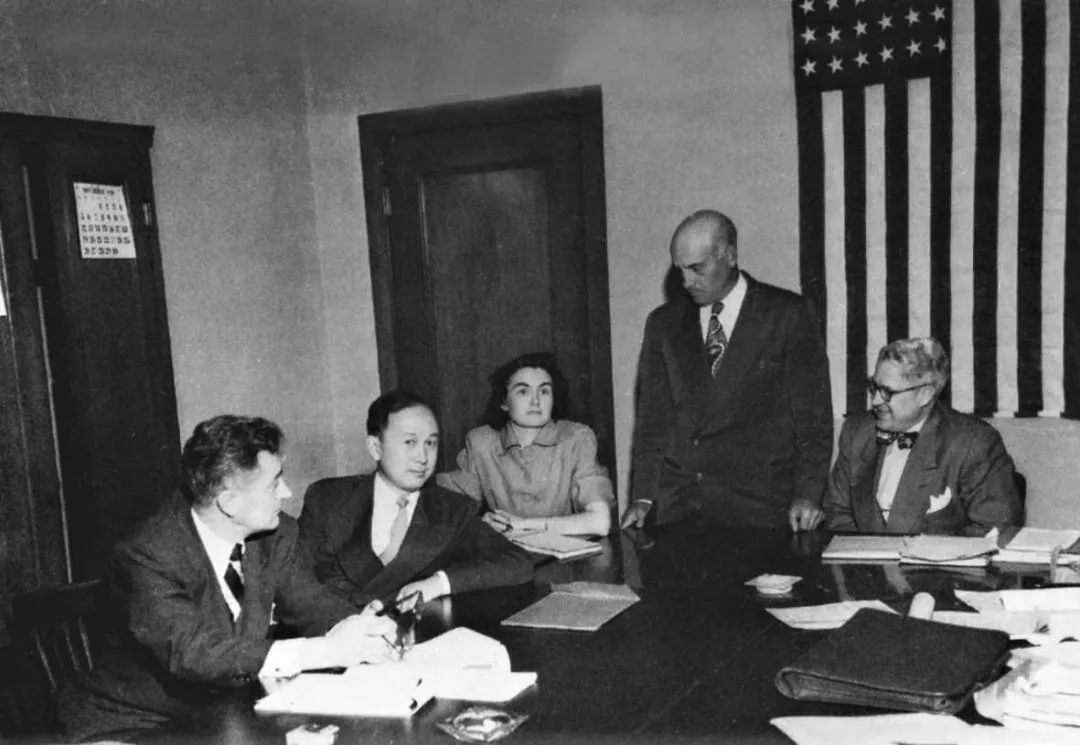
The 1950’s security hearing of Qian (second left). (Image source).
After losing his security clearance, Qian began to pack up, saying he wanted to visit his aging parents back home. Federal agents seized his luggage, which they claimed contained classified materials, and arrested him on suspicion of subversive activity. Although Qian denied any Communist leanings and rejected the accusation, he was detained by the government in California and spent the next five years under house arrest.
Five years later, in 1955, two years after the end of the Korean War, Qian was sent home to China as part of an apparent exchange for 11 American airmen who had been captured during the war. He told waiting reporters he “would never step foot in America again,” and he kept his promise (BBC 2020).
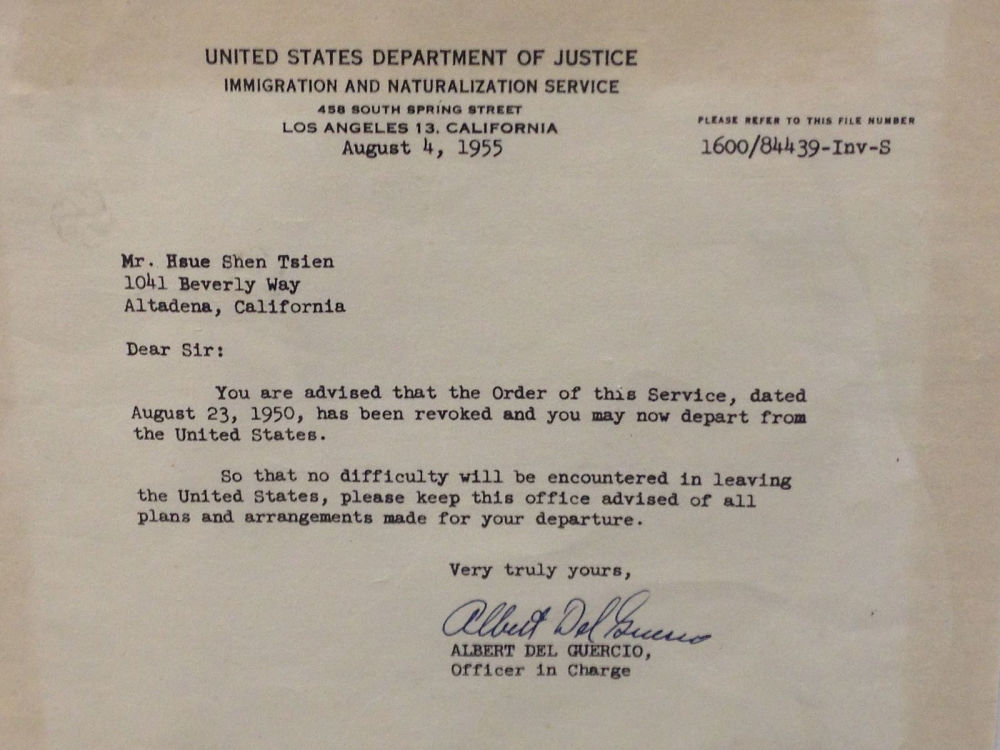
A letter from the US Immigration and Naturalization Service to Qian Xuesen, dated August 4, 1955, in which he was notified he was allowed to leave the US. The original copy is owned by Qian Xuesen Library of Shanghai Jiao Tong University, where the photo was taken. (Caption and image via wiki).
Dan Kimball, who was the Secretary of the US Navy at the time, expressed his regret about Qian’s departure, reportedly stating, “I’d rather shoot him dead than let him leave America. Wherever he goes, he equals five divisions.” He also stated: “It was the stupidest thing this country ever did. He was no more a communist than I was, and we forced him to go” (Perrett & Bradley, 2008).
Kimball may have foreseen the unfolding events accurately. After his return to China, Qian did indeed assume a pivotal role in enhancing China’s military capabilities, possibly surpassing the potency of five divisions. The missile programme that Qian helped develop in China resulted in weapons which were then fired back on America, including during the 1991 Gulf War (BBC 2020).
Returning: Becoming a National Hero
The China that Qian Xuesen had left behind was an entirely different China than the one he returned to. China, although having relatively few experts in the field, was embracing new possibilities and technologies related to rocketry and space exploration.
Within less than a month of his arrival, Qian was welcomed by the then Vice Prime Minister Chen Yi, and just four months later, he had the honor of meeting Chairman Mao himself.
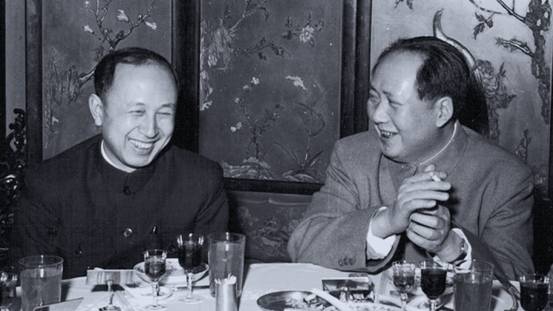
Qian and Mao (image source).
In China, Qian began a remarkably successful career in rocket science, with great support from the state. He not only assumed leadership but also earned the distinguished title of the “father” of the Chinese missile program, instrumental in equipping China with Dongfeng ballistic missiles, Silkworm anti-ship missiles, and Long March space rockets.
Additionally, his efforts laid the foundation for China’s contemporary surveillance system.
By now, Qian has become somewhat of a folk hero. His tale of returning to China despite being thwarted by the U.S. government has become like a legendary narrative in China: driven by unwavering patriotism, he willingly abandoned his overseas success, surmounted formidable challenges, and dedicated himself to his motherland.
Throughout his lifetime, Qian received numerous state medals in recognition of his work, establishing him as a nationally celebrated intellectual. From 1989 to 2001, the state-launched public movement “Learn from Qian Xuesen” was promoted throughout the country, and by 2001, when Qian turned 90, the national praise for him was on a similar level as that for Deng Xiaoping in the decade prior (Wang 2011).
Qian Xuesen remains a celebrated figure. On September 3rd of this year, a new “Qian Xuesen School” was established in Wenzhou, Zhejiang Province, becoming the sixth high school bearing the scientist’s name since the founding of the first one only a year ago.
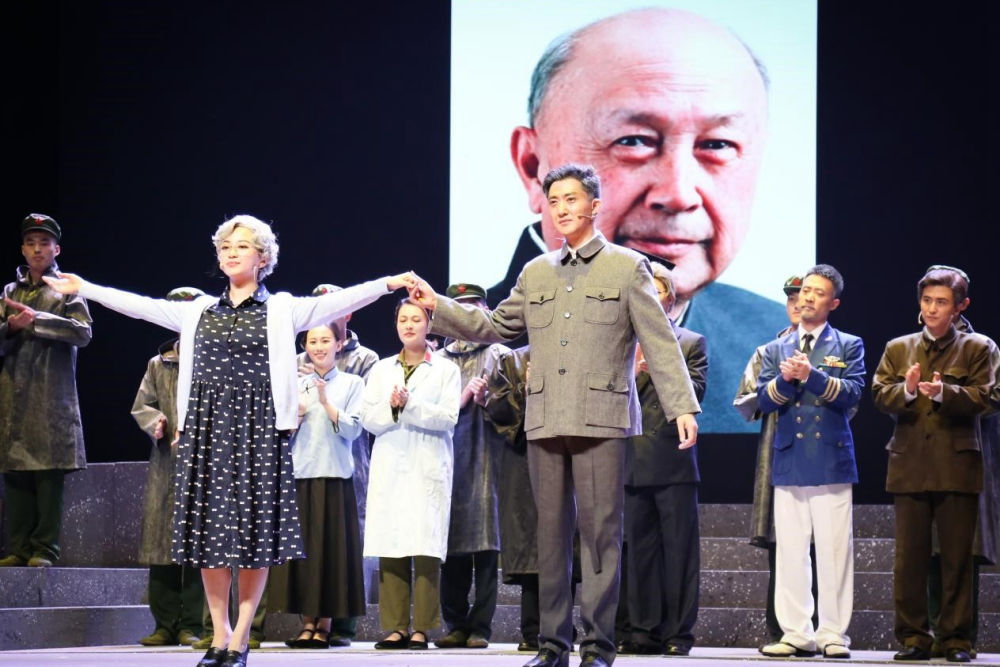
In 2017, the play “Qian Xuesen” was performed at Qian’s alma mater, Shanghai Jiaotong University. (Image source.)
Qian Xuesen’s legacy extends well beyond educational institutions. His name frequently appears in the media, including online articles, books, and other publications. There is the Qian Xuesen Library and a museum in Shanghai, containing over 70,000 artefacts related to him. Qian’s life story has also been the inspiration for a theater production and a 2012 movie titled Hsue-Shen Tsien (钱学森).2
Unanswered Questions
As is often the case when people are turned into heroes, some part of the stories are left behind while others are highlighted. This holds true for both Robert Oppenheimer and Qian Xuesen.
The Communist Party of China hailed Qian as a folk hero, aligning with their vision of a strong, patriotic nation. Many Chinese narratives avoid the debate over whether Qian’s return was linked to problems and accusations in the U.S., rather than genuine loyalty to his homeland.
In contrast, some international media have depicted Qian as a “political opportunist” who returned to China due to disillusionment with the U.S., also highlighting his criticism of “revisionist” colleagues during the Cultural Revolution and his denunciation of the 1989 student demonstrations.
Unlike the image of a resolute loyalist favored by the Chinese public, Qian’s political ideology was, in fact, not consistently aligned, and there were instances where he may have prioritized opportunity over loyalty at different stages of his life.
Qian also did not necessarily aspire to be a “flawless hero.” Upon returning to China, he declined all offers to have his biography written for him and refrained from sharing personal information with the media. Consequently, very little is known about his personal life, leaving many questions about the motivations driving him, and his true political inclinations.

The marriage photo of Qian and Jiang. (Image source).
We do know that Qian’s wife, Jiang Ying (蒋英), had a remarkable background. She was of Chinese-Japanese mixed race and was the daughter of a prominent military strategist associated with Chiang Kai-shek. Jiang Ying was also an accomplished opera singer and later became a professor of music and opera at the Central Conservatory of Music in Beijing.
Just as with Qian, there remain numerous unanswered questions surrounding Oppenheimer, including the extent of his communist sympathies and whether these sympathies indirectly assisted the Soviet Union during the Cold War.
Perhaps both scientists never imagined they would face these questions when they first decided to study physics. After all, they were scientists, not the heroes that some narratives portray them to be.
Also read:
■ Farewell to a Self-Taught Master: Remembering China’s Colorful, Bold, and Iconic Artist Huang Yongyu
■ “His Name Was Mao Anying”: Renewed Remembrance of Mao Zedong’s Son on Chinese Social Media
By Zilan Qian
Follow @whatsonweibo
1 Some sources claim that Qian was born in Hangzhou, while others say he was born in Shanghai with ancestral roots in Hangzhou.
2The Chinese character 钱 is typically romanized as “Qian” in Pinyin. However, “Tsien” is a romanization in Wu Chinese, which corresponds to the dialect spoken in the region where Qian Xuesen and his family have ancestral roots.
This article has been edited for clarity by Manya Koetse
References (other sources hyperlinked in text)
BBC. 2020. “Qian Xuesen: The man the US deported – who then helped China into space.” BBC.com, 27 October https://www.bbc.com/news/stories-54695598 [9.16.23].
Monk, Ray. 2013. Robert Oppenheimer: A Life inside the Center, First American Edition. New York: Doubleday.
Perrett, Bradley, and James R. Asker. 2008. “Person of the Year: Qian Xuesen.” Aviation Week and Space Technology 168 (1): 57-61.
Wang, Ning. 2011. “The Making of an Intellectual Hero: Chinese Narratives of Qian Xuesen.” The China Quarterly, 206, 352-371. doi:10.1017/S0305741011000300
Get the story behind the hashtag. Subscribe to What’s on Weibo here to receive our newsletter and get access to our latest articles:
Spotted a mistake or want to add something? Please let us know in comments below or email us. First-time commenters, please be patient – we will have to manually approve your comment before it appears.
©2023 Whatsonweibo. All rights reserved. Do not reproduce our content without permission – you can contact us at info@whatsonweibo.com.
Backgrounder
Farewell to a Self-Taught Master: Remembering China’s Colorful, Bold, and Iconic Artist Huang Yongyu
Renowned Chinese artist and the creator of the ‘Blue Rabbit’ zodiac stamp Huang Yongyu has passed away at the age of 98. “I’m not afraid to die. If I’m dead, you may tickle me and see if I smile.”
Published
2 years agoon
June 15, 2023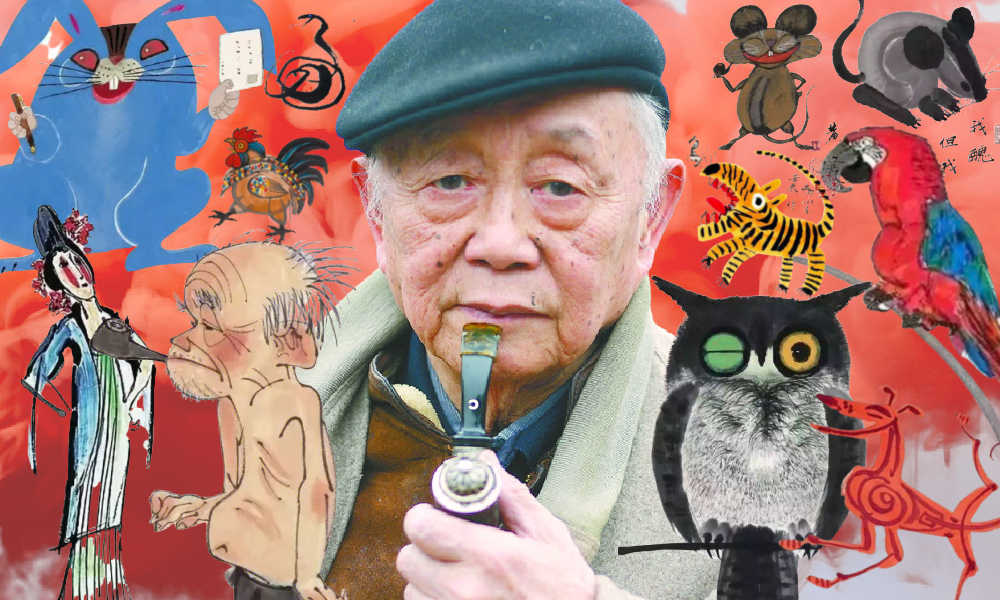
The famous Chinese painter, satirical poet, and cartoonist Huang Yongyu has passed away. Born in 1924, Huang endured war and hardship, yet never lost his zest for life. When his creativity was hindered and his work was suppressed during politically tumultuous times, he remained resilient and increased “the fun of living” by making his world more colorful.
He was a youthful optimist at old age, and will now be remembered as an immortal legend. The renowned Chinese painter and stamp designer Huang Yongyu (黄永玉) passed away on June 13 at the age of 98. His departure garnered significant attention on Chinese social media platforms this week.
On Weibo, the hashtag “Huang Yongyu Passed Away” (#黄永玉逝世#) received over 160 million views by Wednesday evening.
Huang was a member of the China National Academy of Painting (中国国家画院) as well as a Professor at the Central Academy of Fine Arts (中央美术学院).
Huang Yongyu is widely recognized in China for his notable contribution to stamp design, particularly for his iconic creation of the monkey stamp in 1980. Although he designed a second monkey stamp in 2016, the 1980 stamp holds significant historical importance as it marked the commencement of China Post’s annual tradition of releasing zodiac stamps, which have since become highly regarded and collectible items.
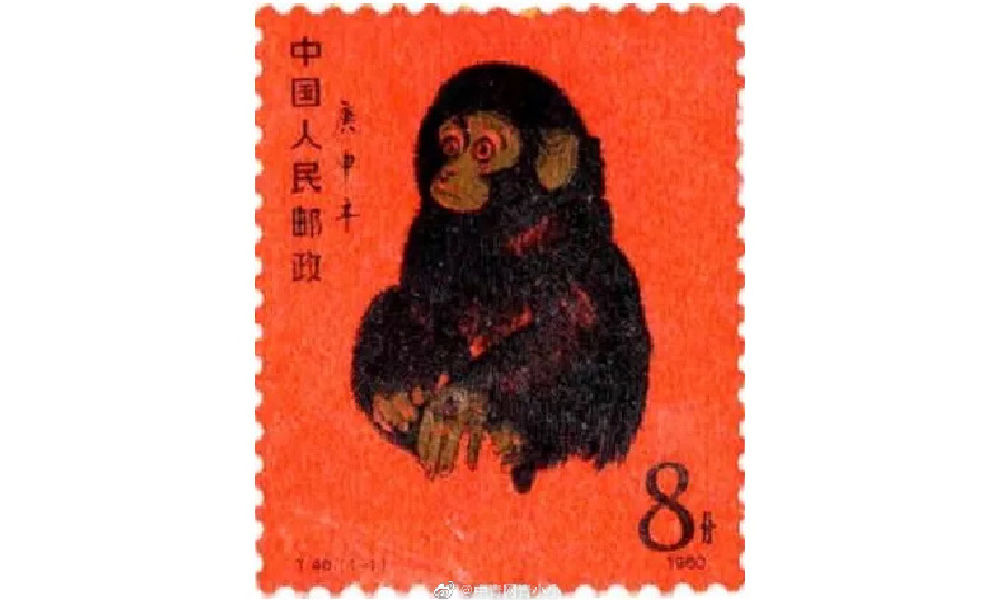
Huang’s famous money stamp that was issued by China Post in 1980.
The monkey stamp designed by Huang Yongyu has become a cherished collector’s item, even outside of China. On online marketplaces like eBay, individual stamps from this series are being sold for approximately $2000 these days.
Huang Yongyu’s latest most famous stamp was this year’s China Post zodiac stamp. The stamp, a blue rabbit with red eyes, caused some online commotion as many people thought it looked “horrific.”
Some thought the red-eyed blue rabbit looked like a rat. Others thought it looked “evil” or “monster-like.” There were also those who wondered if the blue rabbit looked so wild because it just caught Covid.
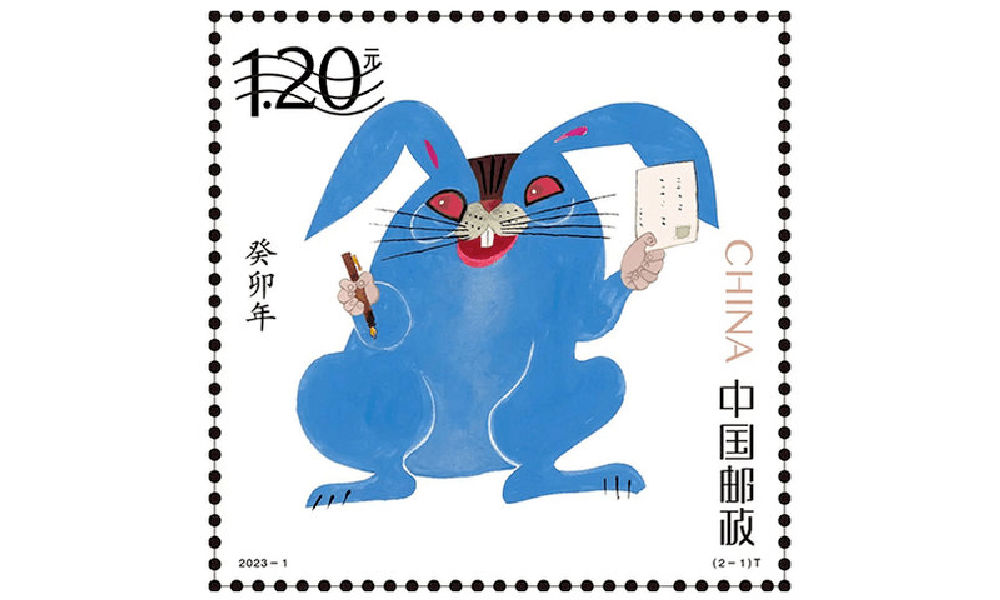
Huang’s (in)famous blue rabbit stamp.
Nevertheless, many people lined up at post offices for the stamps and they immediately sold out.
In light of the controversy, Huang Yongyu spoke about the stamps in a livestream in January of 2023. The 98-year-old artist claimed he had simply drawn the rabbit to spread joy and celebrate the new year, stating, “Painting a rabbit stamp is a happy thing. Everyone could draw my rabbit. It’s not like I’m the only one who can draw this.”
Huang’s response also went viral, with one Weibo hashtag dedicated to the topic receiving over 12 million views (#蓝兔邮票设计者直播回应争议#) at the time. Those defending Huang emphasized how it was precisely his playful, light, and unique approach to art that has made Huang’s work so famous.
A Self-Made Artist
“I’m ugly, but my mum likes me”
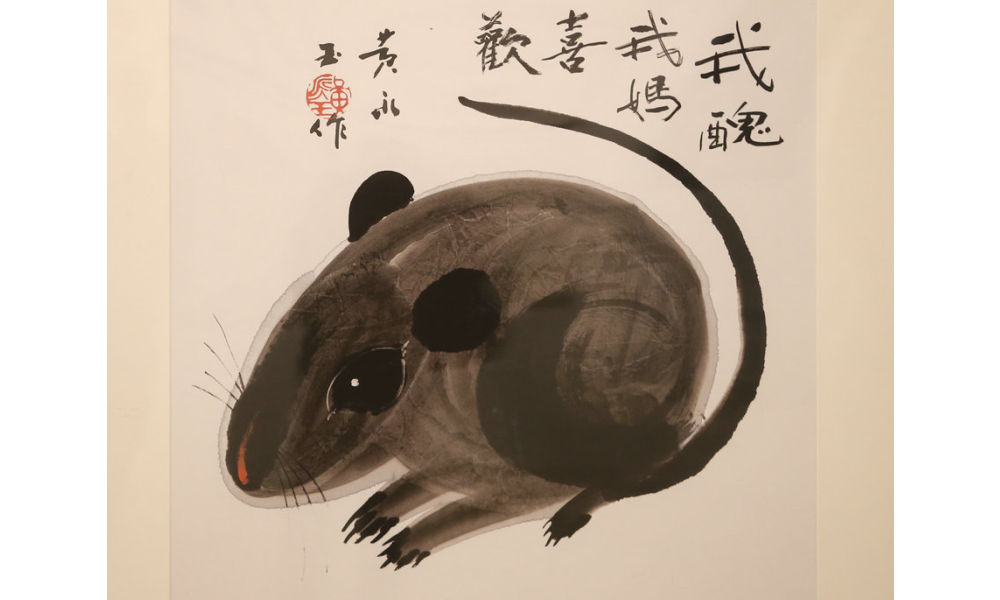
‘Ugly Mouse’ by Huang Yongyu [Image via China Daily].
Huang Yongyu was born on August 9, 1924, in Hunan’s Chengde as a native of the Tujia ethnic group.
He was born into an extraordinary family. His grandfather, Huang Jingming (黄镜铭), worked for Xiong Xiling (熊希齡), who would become the Premier of the Republic of China. His first cousin and lifelong friend was the famous Chinese novelist Shen Congwen (沈从文). Huang’s father studied music and art and was good at drawing and playing the accordion. His mother graduated from the Second Provincial Normal School and was the first woman in her county to cut her hair short and wear a short skirt (CCTV).
Born in times of unrest and poverty, Huang never went to college and was sent away to live with relatives at the age of 13. His father would die shortly after, depriving him of a final goodbye. Huang started working in various places and regions, from porcelain workshops in Dehua to artisans’ spaces in Quanzhou. At the age of 16, Huang was already earning a living as a painter and woodcutter, showcasing his talents and setting the foundation for his future artistic pursuits.
When he was 22, Huang married his first girlfriend Zhang Meixi (张梅溪), a general’s daughter, with whom he shared a love for animals. He confessed his love for her when they both found themselves in a bomb shelter after an air-raid alarm.
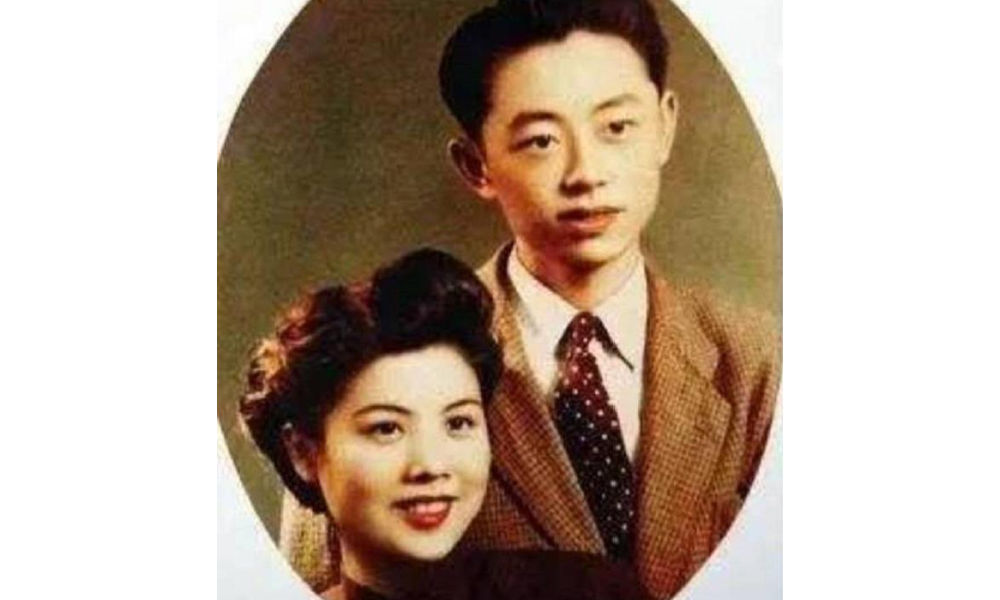
Huang and Zhang Meixi [163.com]
In his twenties, Huang Yongyu emerged as a sought-after artist in Hong Kong, where he had relocated in 1948 to evade persecution for his left-wing activities. Despite achieving success there, he heeded Shen Congwen’s advice in 1953 and moved to Beijing. Accompanied by his wife and their 7-month-old child, Huang took on a teaching position at the esteemed Central Academy of Fine Arts (中央美术学院).
The couple raised all kinds of animals at their Beijing home, from dogs and owls to turkeys and sika deers, and even monkeys and bears (Baike).
Throughout Huang’s career, animals played a significant role, not only reflecting his youthful spirit but also serving as vehicles for conveying satirical messages.
One recurring motif in his artwork was the incorporation of mice. In one of his famous works, a grey mouse is accompanied by the phrase ‘I’m ugly, but my mum likes me’ (‘我丑,但我妈喜欢’), reinforcing the notion that regardless of our outward appearance or circumstances, we remain beloved children in the eyes of our mothers.
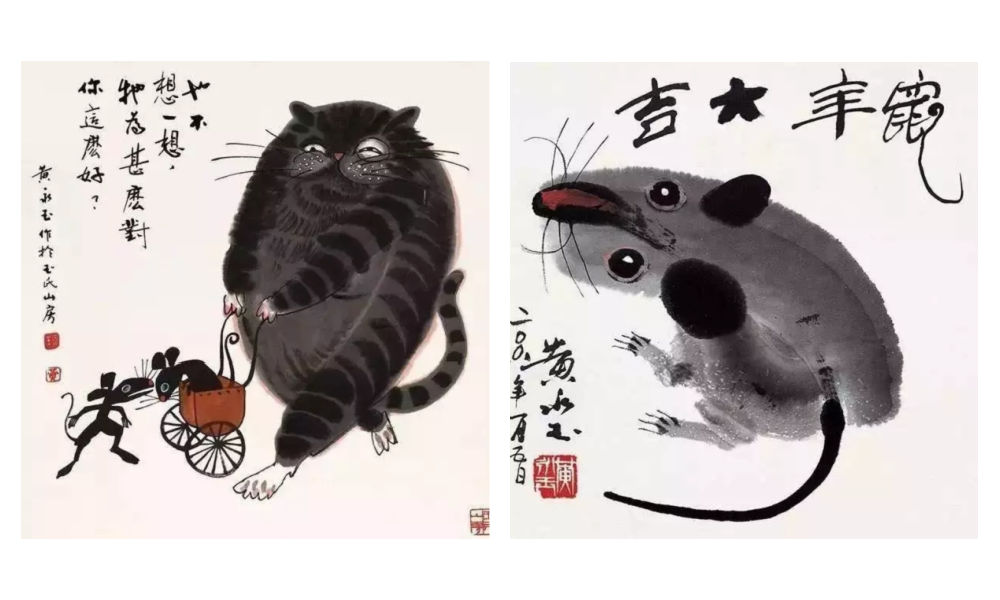
As a teacher, Huang liked to keep his lessons open-minded and he, who refused to join the Party himself, stressed the importance of art over politics. He would hold “no shirt parties” in which his all-male studio students would paint in an atmosphere of openness and camaraderie during hot summer nights (Andrews 1994, 221; Hawks 2017, 99).
By 1962, creativity in the classroom was limited and there were far more restrictions to what could and could not be created, said, and taught.
Bright Colors in Dark Times
“Strengthen my resolve and increase the fun of living”
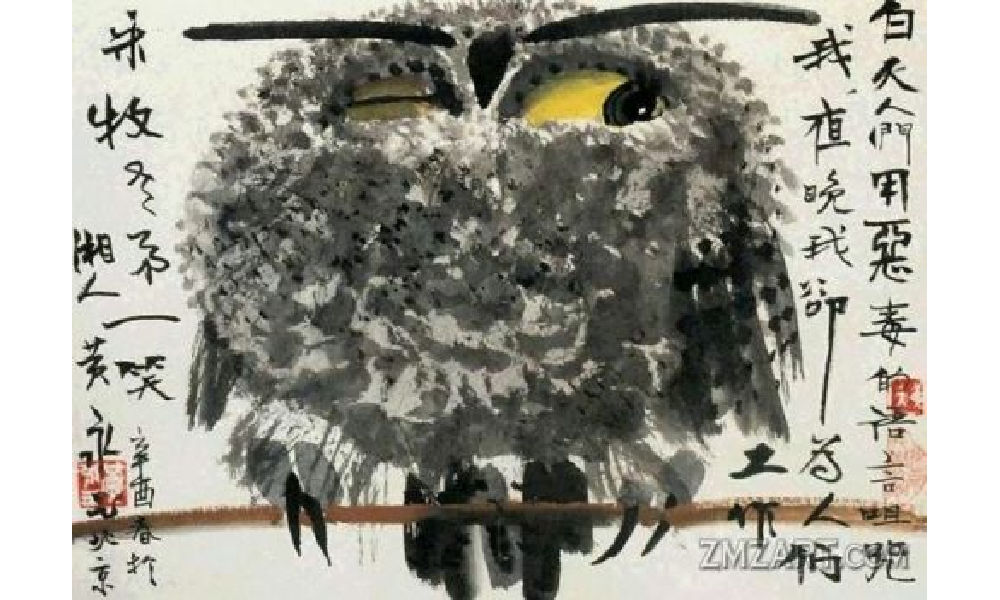
Huang Yongyu’s winking owl, 1973, via Wikiart.
In 1963, Huang was sent to the countryside as part of the “Four Cleanups” movement (四清运动, 1963-1966). Although Huang cooperated with the requirement to attend political meetings and do farm work, he distanced himself from attempts to reform his thinking. In his own time, and even during political meetings, he would continue to compose satirical and humorous pictures and captions centered around animals, which would later turn into his ‘A Can of Worms’ series (Hawks 2017, 99; see Morningsun.org).
Three years later, at the beginning of the Cultural Revolution, many Chinese major artists, including Huang, were detained in makeshift jails called ‘niupeng‘ (牛棚), cowsheds. Huang’s work was declared to be counter-revolutionary, and he was denounced and severely beaten. Despite the difficult circumstances, Huang’s humor and kindness would remind his fellow artist prisoners of the joy of daily living (2017, 95-96).
After his release, Huang and his family were relocated to a cramped room on the outskirts of Beijing. The authorities, thinking they could thwart his artistic pursuits, provided him with a shed that had only one window, which faced a neighbor’s wall. However, this limitation didn’t deter Huang. Instead, he ingeniously utilized vibrant pigments that shone brightly even in the dimly lit space.
During this time, he also decided to make himself an “extra window” by creating an oil painting titled “Eternal Window” (永远的窗户). Huang later explained that the flower blossoms in the paining were also intended to “strengthen my resolve and increase the fun of living” (Hawks 2017, 4; 100-101).
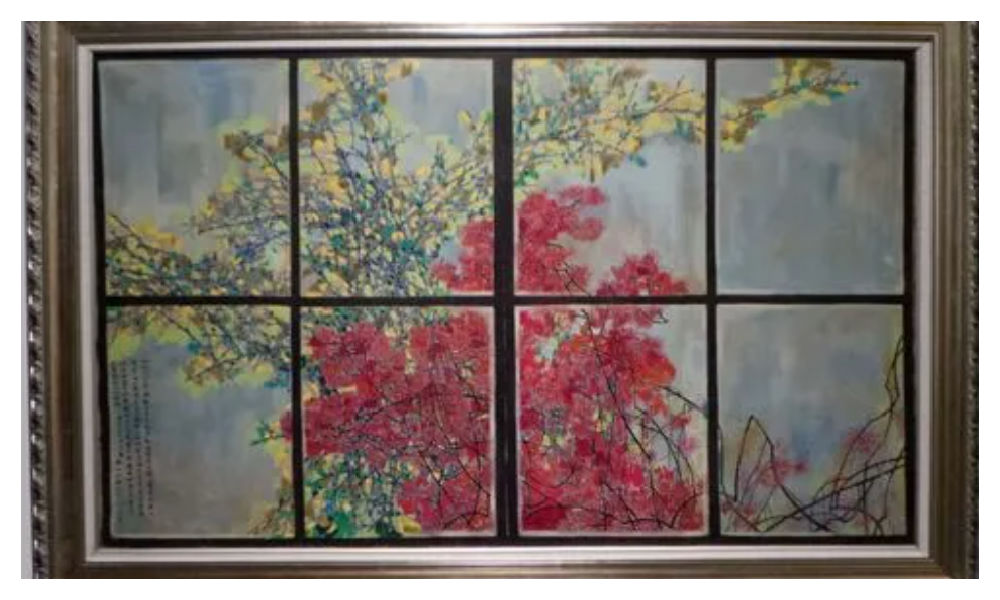
Huang Yongyu’s Eternal Window [Baidu].
In 1973, during the peak of the Cultural Revolution, Huang painted his famous winking owl. The calligraphy next to the owl reads: “During the day people curse me with vile words, but at night I work for them” (“白天人们用恶毒的语言诅咒我,夜晚我为他们工作”) (Matthysen 2021, 165).
The painting was seen as a display of animosity towards the regime, and Huang got in trouble for it. Later on in his career, however, Huang would continue to paint owls. In 1977, when the Cultural Revolution had ended, Huang Yongyu painted other owls to ridicules his former critics (2021, 174).
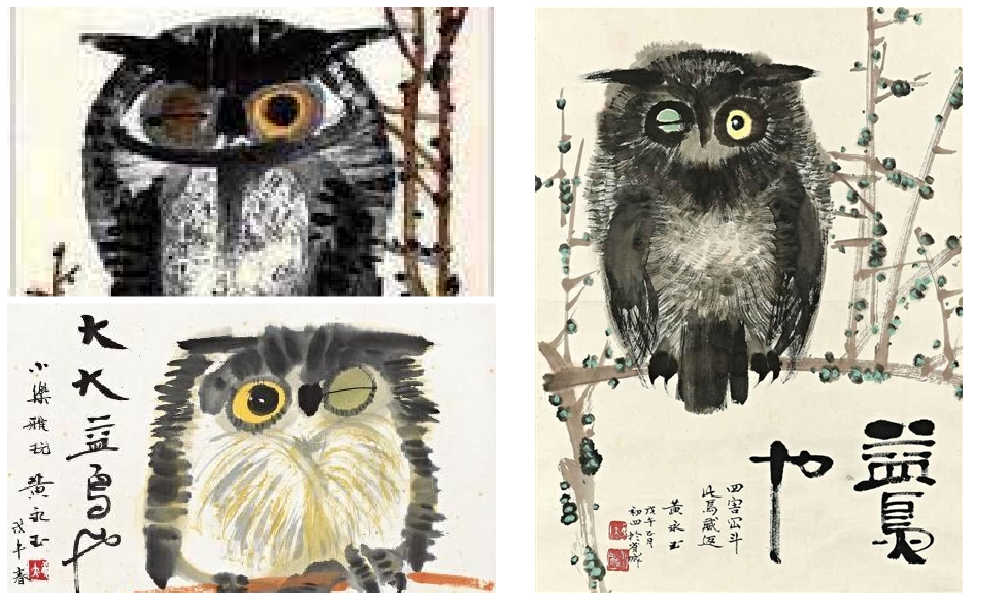
According to art scholar Shelly Drake Hawks, Huang Yongyu employed animals in his artwork to satirize the realities of life under socialism. This approach can be loosely compared to George Orwell’s famous novel Animal Farm.
However, Huang’s artistic style, vibrant personal life, and boundary-pushing work ethic also draw parallels to Picasso. Like Picasso, Huang embraced a colorful life, adopted an innovative approach to art, and challenged artistic norms.
An Optimist Despite All Hardships
“Quickly come praise me, while I’m still alive”
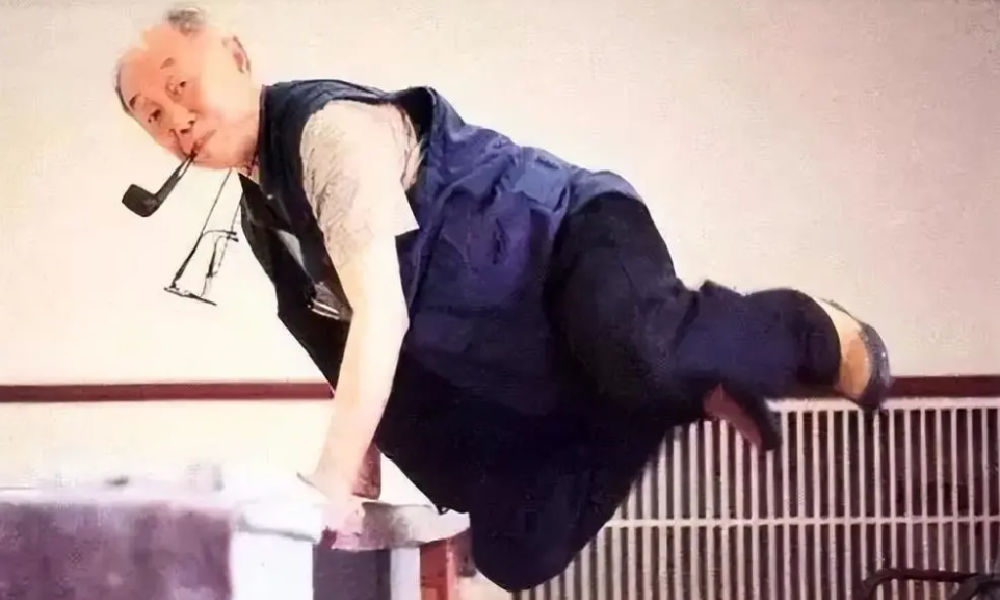
Huang Yongyu will be remembered in China with love and affection for numerous reasons. Whether it is his distinctive artwork, his mischievous smile and trademark pipe, his unwavering determination to follow his own path despite the authorities’ expectations, or his enduring love for his wife of over 75 years, there are countless aspects to appreciate and admire about Huang.
One things that is certainly admirable is how he was able to maintain a youthful and joyful attitude after suffering many hardships and losing so many friends.
“An intriguing soul. Too wonderful to describe,” one Weibo commenter wrote about Huang, sharing pictures of Huang Yongyu’s “Scenes of Pooping” (出恭图) work.
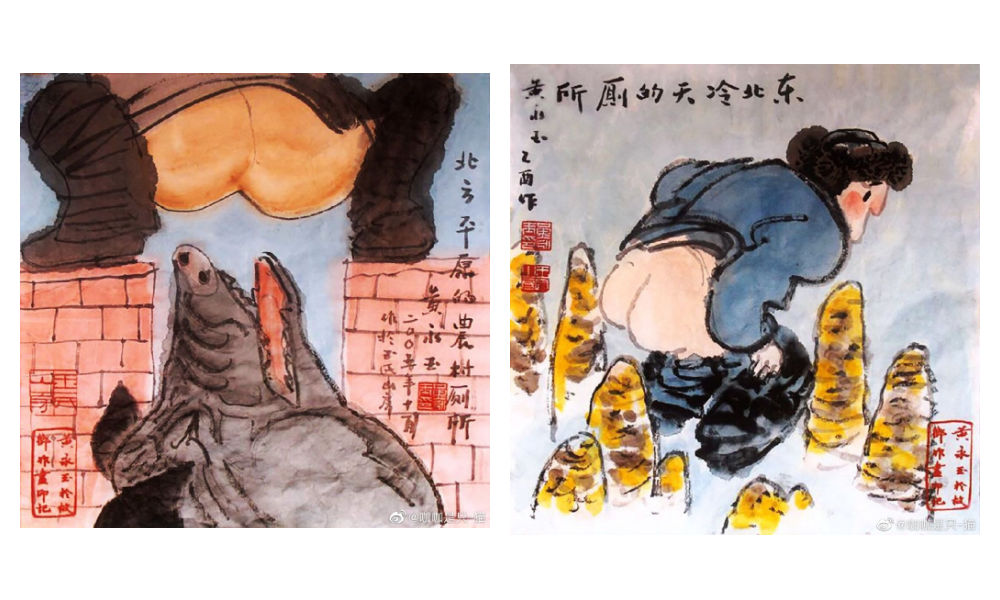
Old age did not hold him back. At the age of 70, his paintings sold for millions. When he was in his eighties, he was featured on the cover of Esquire (时尚先生) magazine.
At the age of 82, he stirred controversy in Hong Kong with his “Adam and Eve” sculpture featuring male and female genitalia, leading to complaints from some viewers. When confronted with the backlash, Huang answered, “I just wanted to have a taste of being sued, and see how the government would react” (Ora Ora).
I'm guessing the 98-year-old Huang loved the controversy. When confronted with backlash for his sculpture featuring male and female genitalia in 2007 Hong Kong, Huang answered, "I just wanted to have a taste of being sued, and see how the government would react." pic.twitter.com/kG0MVVM4SN
— Manya Koetse (@manyapan) June 15, 2023
In his nineties, he started driving a Ferrari. He owned mansions in his hometown in Hunan, in Beijing, in Hong Kong, and in Italy – all designed by himself (Chen 2019).
Huang kept working and creating until the end of his life. “It’s good to work diligently. Your work may be meaningful. Maybe it won’t be. Don’t insist on life being particularly meaningful. If it’s happy and interesting, then that’s great enough.”
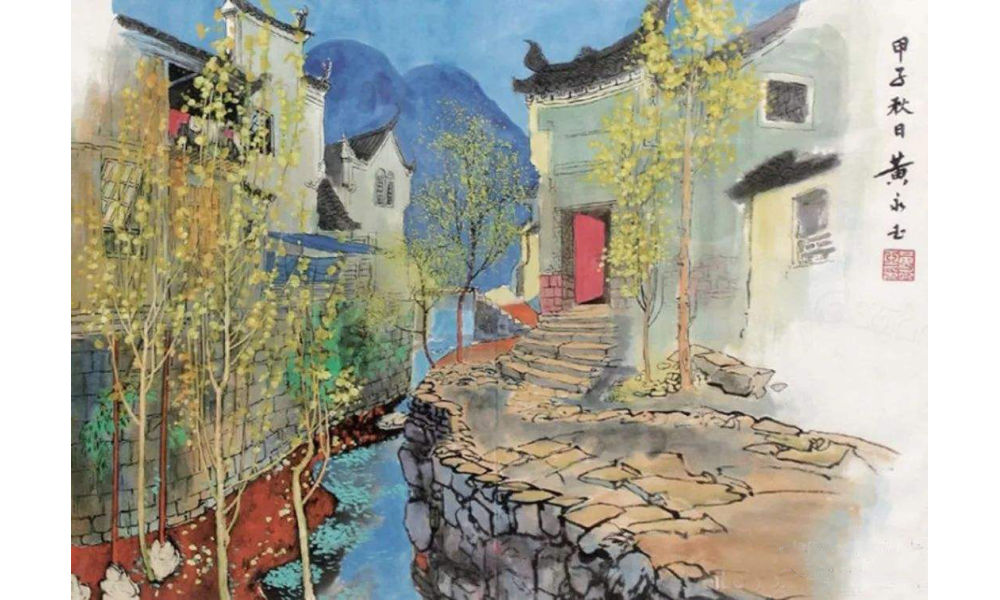
“Hometown Scenery” or rather “Hunan Scenery” (湘西风景) by Huang.
Huang did not dread the end of his life.
“My old friends have all died, I’m the only one left,” he said at the age of 95. He wrote his will early and decided he wanted a memorial service for himself before his final departure. “Quickly come praise me, while I’m still alive,” he said, envisioning himself reclining on a chair in the center of the room, “listening to how everyone applauds me” (CCTV, Sohu).
He stated: “I don’t fear death at all. I always joke that when I die, you should tickle me first and see if I’ll smile” (“对死我是一点也不畏惧,我开玩笑,我等死了之后先胳肢我一下,看我笑不笑”).

Huang with Yiwo (伊喔), the original model for the monkey stamp [Shanghai Observer].
Huang also was not sentimental about what should happen to his ashes. In a 2019 article in Guangming Daily, it was revealed that he suggested to his wife the idea of pouring his ashes into the toilet and flushing them away with the water.
However, his wife playfully retorted, saying, “No, that won’t do. Your life has been too challenging; you would clog the toilet.”
To this, Huang responded, “Then wrap my ashes into dumplings and let everyone [at the funeral] eat them, so you can tell them, ‘You’ve consumed Huang Yongyu’s ashes!'”
But she also opposed of that idea, saying that they would vomit and curse him forever.
Nevertheless, his wife expressed opposition to this idea, citing concerns that it would cause people to vomit and curse him indefinitely.
In response, Huang declared, “Then let’s forget about my ashes. If you miss me after I’m gone, just look up at the sky and the clouds.” Eventually, his wife would pass away before him, in 2020, at the age of 98, having spent 77 years together with Huang.
Huang will surely be missed. Not just by the loved ones he leaves behind, but also by millions of his fans and admirers in China and beyond.
“We will cherish your memory, Mr. Huang,” one Weibo blogger wrote. Others honor Huang by sharing some of his famous quotes, such as, “Sincerity is more important than skill, which is why birds will always sing better than humans” (“真挚比技巧重要,所以鸟总比人唱得好”).
Among thousands of other comments, another social media user bid farewell to Huang Yongyu: “Our fascinating Master has transcended. He is now a fascinating soul. We will fondly remember you.”
By Manya Koetse
Get the story behind the hashtag. Subscribe to What’s on Weibo here to receive our newsletter and get access to our latest articles:
References
Andrews, Julia Frances. 1994. Painters and Politics in the People’s Republic of China, 1949-1979. Berkley: University of California Press.
Baike. “Huang Yongyu 黄永玉.” Baidu Baike https://baike.baidu.com/item/%E9%BB%84%E6%B0%B8%E7%8E%89/1501951 [June 14, 2023].
CCTV. 2023. “Why Everyone Loves Huang Yongyu [为什么人人都爱黄永玉].” WeChat 央视网 June 14.
Chen Hongbiao 陈洪标. 2019. “Most Spicy Artist: Featured in a Magazine at 80, Flirting with Lin Qingxia at 91, Playing with Cars at 95, Wants Memorial Service While Still Alive [最骚画家:80岁上杂志,91岁撩林青霞,95岁玩车,活着想开追悼会].” Sohu/Guangming Daily March 16: https://www.sohu.com/a/301686701_819105 [June 15, 2023].
Hawks, Shelley Drake. 2017. The Art of Resistance Painting by Candlelight in Mao’s China. Seattle: University of Washington Press.
Matthysen, Mieke. 2021. Ignorance is Bliss: The Chinese Art of Not Knowing. Palgrave Macmillan.
Ora Ora. “HUANG YONGYU 黃永玉.” Ora Ora https://www.ora-ora.com/artists/103-huang-yongyu/ [June 15, 2023].
Spotted a mistake or want to add something? Please let us know in comments below or email us. First-time commenters, please be patient – we will have to manually approve your comment before it appears.
©2023 Whatsonweibo. All rights reserved. Do not reproduce our content without permission – you can contact us at info@whatsonweibo.com.
Subscribe

China’s Major Food Delivery Showdown: What to Know about the JD.com vs. Meituan Clash

The Liaoyang Restaurant Fire That Killed 22 People

China Is Not Censoring Its Social Media to Please the West

Aftermath of Suzhou Marathon’s “Pissing Gate”

Do You Know Who Li Gang Is? Anti-Corruption Official Arrested for Corruption

Beyond the Box Office: What’s Behind Ne Zha 2’s Success?

IShowSpeed in China: Streaming China’s Stories Well

Tuning Into the Year of the Snake

“Black Myth: Wukong”: From Gaming Screens to the CMG Spring Festival Gala?

Collective Grief Over “Big S”

US-Russia Rapprochement and “Saint Zelensky”: Chinese Online Reactions to Trump’s Shake-Up

Chinese New Nickname for Trump Mixes Fairy Tales with Tariff War

China Reacts: 3 Trending Hashtags Shaping the Tariff War Narrative

The ‘China-chic Girl’ Image and the Realities of China’s Competitive Food Delivery Market

China Trending Week 15/16: Gu Ming Viral Collab, Maozi & Meigui Fallout, Datong Post-Engagement Rape Case
Get in touch
Would you like to become a contributor, or do you have any tips or suggestions? Get in touch here!
Popular Reads
-

 China Insight12 months ago
China Insight12 months agoThe Tragic Story of “Fat Cat”: How a Chinese Gamer’s Suicide Went Viral
-

 China Digital11 months ago
China Digital11 months agoChina’s 2024 Gaokao Triggers Online Discussions on AI
-

 China Arts & Entertainment12 months ago
China Arts & Entertainment12 months agoSinging Competition or Patriotic Fight? Hunan TV’s ‘Singer 2024’ Stirs Nationalistic Sentiments
-

 China Brands, Marketing & Consumers12 months ago
China Brands, Marketing & Consumers12 months agoA Brew of Controversy: Lu Xun and LELECHA’s ‘Smoky’ Oolong Tea

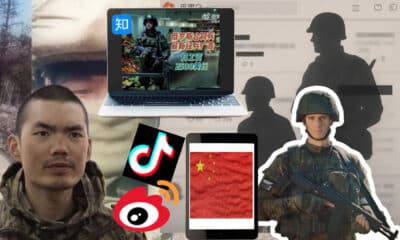



concerned
February 9, 2022 at 4:09 am
but a person’s status is very important…
here the “status” is about whether a person as a wife or a mistress, etc to the outside world, difficult to translate, but not your usual status per se.
Every time you let me go…
should be: Every time you let/invite me stop by (or visit)…
with all the feelings and money between us, it had nothing to do with power and wealth
should be: feelings between us had nothing to do with money and power
There’re quite a few other places (subtle, difficult to convey) that could use better translation. Overall this is basically a jilted lover venting (you have to watch the dramas of dynastic Chinese TV shows to appreciate it: emperor has wife/concubines, and the complicated struggles between emperor/wife/concubines).
Two love birds, in a situation that made it impossible for them to be together (she’s not getting the title/status she thinks she deserves), can make a good TV series. The man was/is in a position of power does add intrigue (can be accused of abuse of power, etc), but nothing beats the ridiculousness of media amplification, without really understand what’s written in Peng’s post.
Surprised at the translation quality of a site that tracks weibo, could be misleading to others for such a high profile (made to be) case.
When anti-China becomes politically correctness in the west, obviously you could never let facts get in your way of propaganda (mainstream media has been coopted in that regard). Sad days ahead.
Shiloh O'Connor
February 21, 2022 at 11:27 pm
amazing that western media has classes this as “sexual assault” or “rape”
when absolutely nothing like that is alleged in any of the text
and she has explicitly said no assault occurred